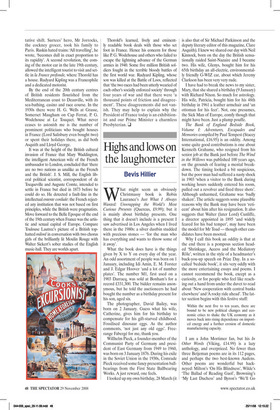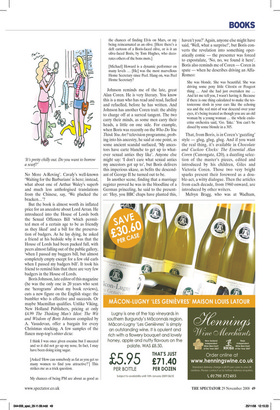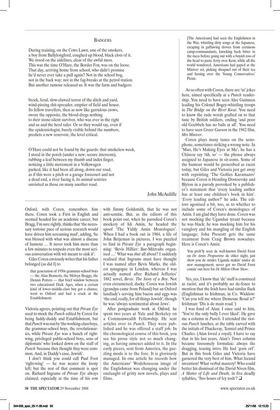Highs and lows on the laughometer
Bevis Hillier
What might seem an obviously Christmassy book is Robin Laurance’s Just What I Always Wanted: Unwrapping the World’s Most Curious Presents (Quercus, £9.99); but it is mainly about birthday presents. One thing that it doesn’t include is a present I saw advertised in Los Angeles when I lived there in the 1980s: a silver dustbin studded with precious stones — ‘for the man who has everything and wants to throw some of it away’.
What the book does have is the things given by X to Y on every day of the year. An odd assortment of people was born on 1 January, including Idi Amin, E. M. Forster and J. Edgar Hoover ‘and a lot of number plates’. The number M1, first used on a 1903 Darracq, was sold at Bonham’s for a record £331,300. The bidder remains anonymous, but he told the auctioneers he had bought the number as a birthday present for his son, aged six.
The photographer, David Bailey, was born on 2 January. Guess what his wife, Catherine, gives him for his birthday to compensate for his gift-starved childhood. Fossilised dinosaur eggs. As the author comments, ‘not just any old eggs’. Freerange Fabergé for me, thank you.
Willhelm Pieck, a founder-member of the Communist Party of Germany and president of East Germany from 1949 to 1960, was born on 3 January 1876. During his exile in the Soviet Union in the 1930s, Comrade Pieck received some fancy presentation ballbearings from the First State Ballbearing Works. A just reward, one feels.
I looked up my own birthday, 28 March (it is also that of Sir Michael Parkinson and the deputy literary editor of this magazine, Clare Asquith). I knew we shared our day with Neil Kinnock, born on the day the British sensationally raided Saint-Nazaire and I became two. His wife, Glenys, bought him for his 65th birthday an all-electric, environmentally friendly G-WIZ car, about which Jeremy Clarkson has been very very rude.
I have had to break the news to my sister, Mary, that she shared a birthday (9 January) with Richard Nixon. So much for astrology. His wife, Patricia, bought him for his 48th birthday in 1961 a leather armchair and ‘an ottoman for his feet’. Not, one presumes, the Sick Man of Europe, comfy though that might have been. Just a plump pouffe.
The Bank of England Bedside Book, Volume I: Adventures, Escapades and Memories compiled by Paul Tempest (Stacey International, £16.95) is an oddity. Among some quite good contributions is one about Kenneth Grahame, who resigned from his senior job at the Bank just before The Wind in the Willows was published 100 years ago, on the grounds of fearing a mental breakdown. The timing looked a bit suspicious, but the poor man had suffered a nasty shock in 1903 ‘when a visitor to the Bank during working hours suddenly entered his room, pulled out a revolver and fired three shots’. Although unharmed, Grahame was ‘badly shaken’. The article suggests some plausible reasons why the Bank may have been ‘reticent’ about him after his resignation. It also suggests that Walter (later Lord) Cunliffe, a director appointed in 1895 ‘and widely feared for his bad temper’, may have been the model for Mr Toad — though other candidates have been mooted.
Why I call this book an oddity is that at the end there is a pompous section headed ‘Shrinkage, Access and the Mediatory Rôle’, written in the style of a headmaster’s buck-you-up speech on Prize Day. In a socalled ‘bedside book’, it sits very oddly with the more entertaining essays and poems. I cannot recommend the book, except as a curiosity, or for people who feel like reaching out a hand from under the duvet to read about ‘New cooperation with central banks elsewhere’ and ‘A rocky ride ahead’. The latter section begins with this festive stuff:
Within the next five to ten years, there are bound to be new political changes and economic crises to shake the UK economy as it moves back into rising dependence on imported energy and a further erosion of domestic manufacturing capacity.
I am a John Mortimer fan, but his In Other Words (Viking, £14.99) is a lazy anthology, and overpriced. No fewer than three Betjeman poems are in its 112 pages, and perhaps the two best-known Audens. Other poems are wonderful but hackneyed: Milton’s ‘On His Blindness’, Wilde’s ‘The Ballad of Reading Gaol’, Browning’s ‘My Last Duchess’ and Byron’s ‘We’ll Go No More A-Roving’. Cavafy’s well-known ‘Waiting for the Barbarians’ is here; instead, what about one of Arthur Waley’s superb and much less anthologised translations from the Chinese, say, ‘We plucked the bracken...’?
But the book is almost worth its inflated price for an anecdote about Lord Arran. He introduced into the House of Lords both the Sexual Offences Bill ‘which permitted men of a certain age to be as friendly as they liked’ and a bill for the preservation of badgers. As he lay dying, he asked a friend at his bedside why it was that the House of Lords had been packed full, with peers almost falling out of the public gallery, ‘when I passed my buggers bill, but almost completely empty except for a few old earls when I passed my badgers bill’. It took his friend to remind him that there are very few badgers in the House of Lords.
Boris Johnson, late editor of this magazine (he was the only one in 20 years who sent me ‘herograms’ about my book reviews), cuts a new figure on the English stage: the bumbler who is effective and succeeds. Or maybe Macmillan qualifies. Unlike Viking, New Holland Publishers, pricing at only £4.99 The Thinking Man’s Idiot: The Wit and Wisdom of Boris Johnson compiled by A. Vasudevan, offer a bargain for every Christmas stocking. A few samples of the flaxen mop-top’s obiter dicta:
I think I was once given cocaine but I sneezed and so it did not go up my nose, In fact, I may have been doing icing sugar.
[Asked ‘How can somebody as fat as you get so many women to find you attractive?’] This strikes me as a trick question. the chances of finding Elvis on Mars, or my being reincarnated as an olive. [Here there’s a deft cartoon of a Boris-faced olive, or is it an olive-faced Boris, by Tom Hughes, who decorates others of the bons mots.] [Michael] Howard is a dynamic performer on many levels ... [He] was the most marvellous Home Secretary since Peel. Hang on, was Peel Home Secretary?
Johnson reminds me of the late, great Alan Coren. He is very literary. You know this is a man who has read and read, fuelled and refuelled, before he has written. And Johnson has another Coren trait: the ability to charge off at a surreal tangent. The two carry their minds, as some men carry their heads, a little on one side. For example, when Boris was recently on the Who Do You Think You Are? television programme, probing into his ancestry, he said at one point, as some ancient scandal surfaced, ‘My ancestors have carte blanche to get up to whatever sexual antics they like’. Anyone else might say: ‘I don’t care what sexual antics my ancestors got up to’, but Boris delivers this imperious ukase, as befits the descendant of George II he turned out to be.
In another scene, finding that a marriage register proved he was in the bloodline of a German princeling, he said to the presenter: ‘Hey, you BBC chaps have planted this, haven’t you?’ Again, anyone else might have said, ‘Well, what a surprise!’, but Boris converts the revelation into something operatically comic — the presenter was forced to expostulate, ‘No, no, we found it here’. Boris also reminds me of Coren — Coren in spate — when he describes driving an AlfaRomeo:
She was blonde. She was beautiful. She was driving some poxy little Citroën or Peugeot thing ... And she had just overtaken me ... And let me tell you, I wasn’t having it. Because if there is one thing calculated to make the testosterone slosh in your ears like the echoing sea and the red mist of war descend over your eyes, it’s being treated as though you are an old woman by a young woman ... the whole endocrine orchestra said, ‘Go. Take.’ You can’t be dissed by some blonde in a 305.
That, from Boris, is in Coren’s ‘guzzling’ style — glug, glug, glug. And if you want the real thing, it’s available in Chocolate and Cuckoo Clocks: The Essential Alan Coren (Canongate, £20), a dazzling selection of the master’s pieces, edited and introduced by his children, Giles and Victoria Coren. Those two very bright sparks present their foreword as a double-act, a witty dialogue. Then the articles from each decade, from 1960 onward, are introduced by other writers.
Melvyn Bragg, who was at Wadham, Oxford, with Coren, remembers him there. Coren took a First in English and seemed headed for an academic career, but Bragg, I’m sure rightly, thinks that ‘the necessary tortoise pace of serious research would have driven him screaming mad’, adding, ‘he was blessed with what was almost a disease of humour ... It never took him more than a few minutes to torpedo even the most serious conversation with wit meant to sink it’.
Giles Coren enviously writes that his father belonged (as did I) to
that generation of 1950s grammar-school boys — the Alan Bennetts, the Melvyn Braggs, the Dennis Potters — that brief window between two educational Dark Ages, when a certain kind of lower-middle-class boy got a chance, went to Oxford and had a crack at the Establishment.
Victoria agrees, pointing out that Private Eye used to mock the Punch edited by Coren for being fuddy-duddy and Establishment, but that Punch was run by ‘the working-class boys, the grammar-school boys, the revolutionaries, while Private Eye was a bunch of rightwing, privileged public-school boys, sons of diplomats’ who looked down on the staff of Punch ‘because they thought they were common. And, in Daddy’s case, Jewish’.
I don’t think you could call Paul Foot ‘right-wing’ — he was nearer the loony left; but the rest of that comment is spot on. Richard Ingrams of Private Eye always claimed, especially at the time of his row with Jimmy Goldsmith, that he was not anti-semitic. But, as the editors of this book point out, when he parodied Coren’s mockery of Idi Amin, he headed the spoof ‘The Yiddy Amin Monologues’. When I had a book out in 1984, a life of John Betjeman in pictures, I was puzzled to find in Private Eye a paragraph beginning: ‘Bevis Hillier: Bar-Mitzvahs organised ...’ What was that all about? I suddenly realised that Ingrams must have thought I was named after Bevis Marks, the oldest synagogue in London, whereas I was actually named after Richard Jefferies’ 1882 novel, Bevis: The Story of a Boy. Not even circumcised, ducky. Coren was Jewish (grandpa came from Poland) but an Oxford landlady’s serving him bacon and eggs was ‘the end, really, for all things Jewish’, though he was ‘always sentimental about Jews’.
After postgraduate work at Oxford, he spent two years at Yale and Berkeley on a Commonwealth Fellowship. He sent articles over to Punch. They were published and he was offered a staff job. In the chronological course of this book, you see his prose style not so much changing, as having annexes added to it. In the early pieces, sent from America, the guzzling mode is to the fore. It is gloriously managed. In one article he records how the Americans’ Wodehousean image of the Englishman was changing under the onslaught of gritty new novels, plays and films.
[The Americans] had seen the Englishmen in the War, whistling dirty songs at the Japanese, escaping in guffawing droves from cretinous camp-commandants, knocking back bitter in the mess before going out with a boyish toss of the head to paste Jerry over Kent, while all the world wondered. Americans had gaped at the Miniver set, picking shrapnel out of their tea and fussing over the Young Conservatives’ Picnic.
As so often with Coren, there are ‘in’ jokes here, aimed specifically at a Punch readership. You need to have seen Alec Guinness leading his Colonel Bogey-whistling troops in The Bridge on the River Kwai. You need to know the rude words grafted on to that tune by British soldiers, ending ‘and poor old Goebbels has no balls at all’. You need to have seen Greer Garson in the 1942 film, Mrs Miniver.
Coren plays many tunes on the xenophone, sometimes striking a wrong note. In ‘Mao, He’s Making Eyes at Me’, he has a Chinese say ‘Ah, so’ — the phrase always assigned to Japanese in sit-coms. Some of the humour would be proscribed as racist today, but Giles and Victoria just get away with reprinting ‘The Gollies Karamazov’ because Coren is blending Dostoevsky and Blyton in a parody provoked by a publisher’s statement that ‘every leading author has at least one children’s book in him’. ‘Every leading author?’ he asks. The editors agonised a bit, too, as to whether to include some of Coren’s monologues of Amin. I am glad they have done. Coren was not mocking the Ugandan tyrant because he was black; he was mocking him for his vainglory and his mangling of the English language; John Prescott gets the same treatment from Craig Brown nowadays. Here is Coren’s Amin: You prob’ly seen de well-known David Frost on De Amin Programme de other night, just show you de strides Uganda makin’ under de new management, never got no David Frost comin’ out here for De Milton Obote Show.
Yes, yes, I know that ‘de’ stuff is construed as racist; and it’s probably no de-fence to mention that the Irish have had similar flack (Englishman to Irishman, in Co. Wicklow: ‘Can you tell me where Demesne Road is?’ Irishman: ‘Dis is de main road.’) I was fond of Alan; I once said to him, ‘You’re the only bully I ever liked’. He gave me a column in Punch. I attended the riotous Punch lunches, at the table carved with the initials of Thackeray, Tenniel and Prince Charles. (Alan loved a royal). I have to say that in his last years, Alan’s Times column became tiresomely formulaic: always the dragging, teasing intro. He had ‘gorn orf’. But in this book Giles and Victoria have garnered the very best of him. What fecund invention! What verbal mastery! Who could better his dismissal of the David Niven film, A Matter of Life and Death, in five deadly syllables, ‘Two hours of fey tosh’? ❑




































































































 Previous page
Previous page